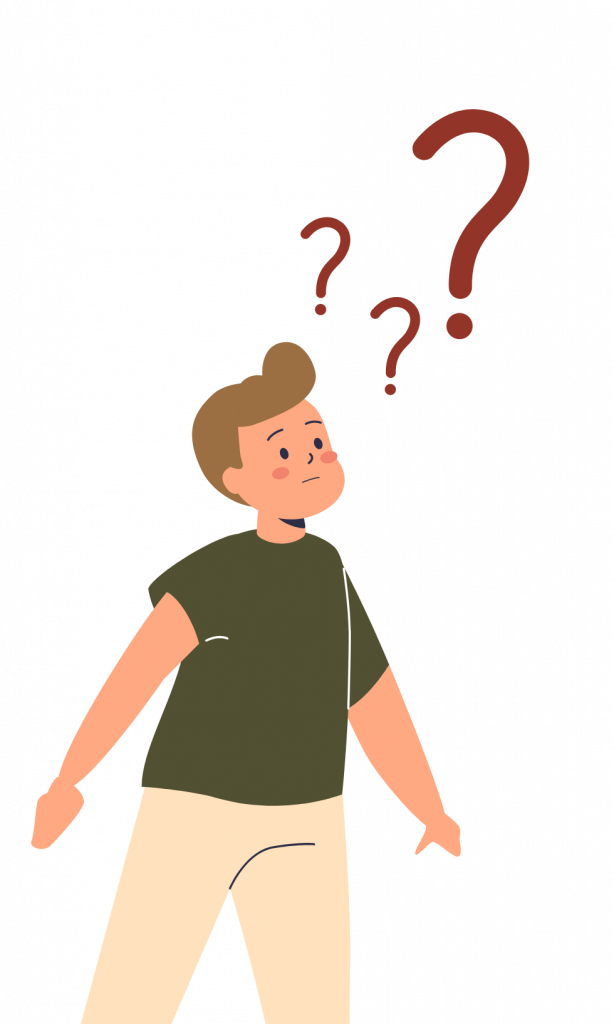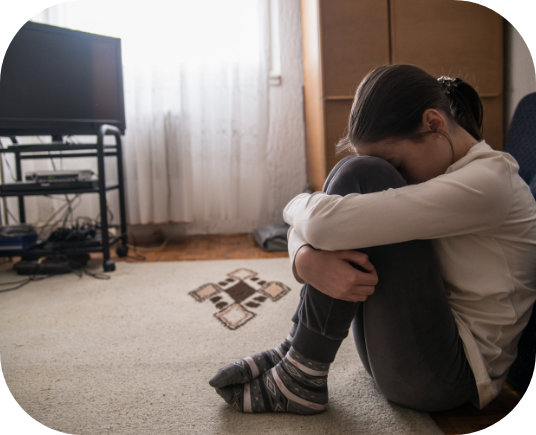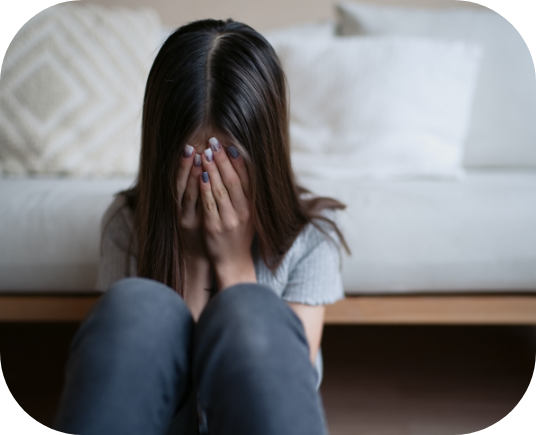

Depression
What Is It?
Depression is a mood disorder which means it affects how a person is feeling. It can cause a person to feel sad a lot of the time or they might lose interest in the things they used to enjoy. Depression influences how a person thinks, acts, and feels. A person with depression is affected physically and emotionally. Depression can make it difficult to do normal daily activities.
Myths / Facts Section
FACT – Depression looks different for everyone and not everyone feels sad all the time with depression.
People often think depression and sadness are the same thing, but they are not. Sadness is an emotion people feel, just like being happy or mad. Everyone feels sad from time to time as a reaction to life. If someone’s sadness goes away and does not impact their life, it is likely not depression. Depression is more than feeling sad. There are some people with depression who do not feel sad. They feel nothing. Depression is different for everyone who has it.
FACT – There is not just one cause of depression.
Mental health is influenced by many different things. The causes of depression are complex. It could be many different factors, such as life events/circumstances, genetics, and medication side effects. This is why successful treatment can look so different for everyone. Depression is wide-ranging in experiences, causes, and treatments.
FACT – Depression can impact anyone.
Depression doesn’t affect just one group of people. More than 264 million people worldwide are affected by depression. Depression impacts people from all backgrounds, ethnicities, age groups, occupations, etc. People of all walks of life can be impacted.
FACT – Depression can impact anyone of any age.
Have you ever been told you cannot have stress because you are just a kid and heard someone say, “Just wait until you are an adult and then you will see what stress is”? Well, that is not true, is it? Just because you do not have the same stressors as an adult does not mean you cannot have stress. It is the same with depression. First, depression does not have to be caused by life events. It can be caused by things like chemical imbalances and genetics. A person can have a seemingly wonderful life and have depression. Second, younger people can face many challenges in their lives. Just because someone is young does not mean their life has been without challenges. Third, there are many challenges in the world today which you face that other generations have not faced before. Technology and social media have created a whole new set of problems, expectations, and stress.
FACT – Depression is an illness.
PET scan of the brain for depression – Mayo Clinic
There is a very real biological side to depression. If someone has depression, they are not “making it up,” “looking for attention,” nor are they “choosing to be depressed.” If you were to look up brain scans, there is a visible difference between someone with depression and someone without depression. If a person has depression, their brain has less activity which can make it harder to think clearly and do the things which need to be done in a day.
FACT – A person who is struggling with depression needs professional help.
If depression is left untreated, there is a chance it will become more severe or last longer. It is not just a phase a person will grow out of and become better. It is not someone being a moody youth/teenager. The person needs proper help to help cope with their depression. Depression comes with a high risk of suicide. Therefore, it is important to get professional help.
FACT – Everyone experiences depression differently.
You might have heard some version of the phrase “When I had depression, I could…They should be able to, too.” There is no one size fits all experience for depression. There is a wide range of symptoms, and everyone experiences depression differently. Even if there are two people who have the same symptom, like exhaustion, it could be different for both. One may not be able to get out of bed. The other could be able to do all the tasks the day requires with tiredness nagging them. Everyone’s experience is different, and everyone’s experience is valid.
FACT – There are many different types of treatments for depression
There are many successful treatments for depression. Treatments could include medication, therapy, and alternative therapies like music and art therapy. In addition to medication and therapies, encouraging a mind/body connection can also help support wellness. This could include relaxation techniques, music/art/drama therapy, exercise, or meditation.
If a person is taking antidepressants (medication) and feels numb, this is an indication the person needs to visit their doctor. Antidepressants should not make a person feel numb. Numbness can be a symptom of depression and the goal of antidepressants is to help relieve the symptoms.
FACT – It is possible to be okay.
With help and healthy habits, it is possible to manage the symptoms of depression. Treatment has proven to be successful. Since there are many causes of depression, it is about finding the appropriate types of therapy which work for the individual.


Causes of Depression
The causes of depression are complex. There are some people who feel that depression is because of a personal flaw. This is incorrect. Personal flaws are not the cause of depression or any other mental illness. This is based on the stigma and misinformation surrounding mental health.
The cause of depression is different for everyone. For many people, there is not just one cause. The causes can range from genetics, chemical imbalance in the brain, stressful life events, trauma, losses, or medical problems.
What Does Depression Look Like?
NOTE – This is not for self-diagnosis. If you feel like you or someone you love is struggling, please seek help.
It is important to remember we cannot be all tiptop all the time. There are days when you or your friend might not feel completely wonderful. That is okay. We all have our days. Depression is more than just a bad day or two. It lasts for weeks, months, or longer.
Depression can look like:
- Sadness
- Loss of interest
- Sleeping all the time or not at all, but still being tired
- Cancelling plans or isolating oneself
- Off in their own world
- Missing assignments, school, practice, or work
- Not changing their clothes or showering
- Irritable
- Edgy/restless
- Thoughts of suicide
- No change. The person might hide what they are going through so there might be seemingly no difference
*These are not the only signs of depression.
It is important to remember that, while some people may display some of these signs, it does not necessarily mean they have depression. They could be coping with a difficult time in their life. This is why it is important for the person to talk to someone.


What To Do If You Think You Have Depression?
If you feel like you are struggling or any of the signs of depression sound like what you are going through, please seek help. Seeking help can sound like a scary task and it can seem overwhelming, but it is so important. You deserve to feel better and be happy.
- Remember, it is okay not to be okay. Everyone has hard times. It takes a very strong person to admit they are not doing well. It is about seeking help when you are not doing well.
- Tell someone you trust. Find someone you trust who will help you connect with professional help. You deserve to feel better and get help! After you tell someone you trust, it’s important to reach out for help with a trusted adult. If you tell someone and they do not listen to you or take you seriously, tell someone else. Sometimes people are caught in their own things or biases and that is not a reflection of you! People who can help could include counselor, elder, spiritual leader, doctor, or social worker.
- Take care of yourself. Make healthy choices for your mental health and practice positive coping skills. Find people who support you.
- Remember, you’ve got this!
In addition to seeking professional support, there are many things you can do to support your wellness. Check out the Tips for Wellness below or the Wellness Sessions.
How to Help?
When someone tells you they are struggling, it can be scary. That is a terrifying thing. It is easy to become caught up in emotions. Many people fear saying the wrong thing. We often want to try to fix our friend’s problems or counsel them, but that is not our job. Your main job is to tell someone and connect your friend to help.
The following are some guidelines as to what to do when your friend tells you they are struggling and how to handle those difficult conversations. There is a good chance your friend will talk to you before they talk to their parents/guardians. This is not to counsel the person. This is to get the person connected with a helping professional. Please remember the conversation will not be linear like on the page. These are guidelines of some things to consider.
The person is telling you something scary and personal to them. This is terrifying for both of you. Take a moment to gather yourself and take a deep breath.
Give the person the time and consideration you would like if you were struggling. Be the friend you would like helping you in this situation by giving your friend your full attention. They deserve it. It will also help you know what your friend is trying to tell you. While you are listening, be understanding and compassionate. Give your friend the space to talk.
- Do not judge your friend. What they are coping with might not seem like a big deal to you, but it is to them. Therefore, it is valid.
- Sometimes when someone tells us how they are struggling, we react with anger or judgement because we are scared. We might say something like “Oh my goodness! How could you say/think something so stupid?”; “Don’t be dumb”; or “How could you say something like that?” As you can imagine, this is not helpful for your friend. What your friend hears is “you are stupid/dumb.”
- Do not interrupt your friend. Being interrupted is very frustrating. It can make the person feel like they are not being heard.
- Put your phone down! Have you ever talked to someone who is on their phone, and they don’t hear a word you say? It can be very frustrating. Treat your friend with the respect they deserve.
- Be the best friend you can be and the person you would like if you were in that situation.
- Do not judge your friend. What they are coping with might not seem like a big deal to you, but it is to them. Therefore, it is valid.
Your friend needs to get help. This is not something you can deal with without professional/adult help. Sometimes, it can feel like adults do not listen or take problems seriously, but this is something you need to talk to an adult about. Help your friend think of someone they trust.
Try saying something like, “Have you thought about who else you could talk to about this?”
“Have you told anyone else?”
“Who do you feel comfortable talking to about this?”
“Okay let’s find you some help. Who do you feel comfortable telling?”
If they feel like they have no one they can trust, talk to someone you trust. Thinking of who to talk to can be really challenging when you are struggling because if can feel so lonely. If your friend is having a hard time thinking of someone to talk to, help connect them with resources, like a school counselor or family liaison worker. You can also offer your friend some helplines they can call when they are struggling too. If you are comfortable, you can also offer to go with your friend to talk to the adult. If the first person you tell does not listen, tell someone else.
If your friend asks you to keep it a secret, you cannot keep it a secret. There are things we keep secret for friends, like their crush or that embarrassing story they swore you to secrecy about, but there are three instances where you must break your friend’s confidence. Depression comes with a higher risk of thinking about suicide.
- They are going to harm themself.
- They are going to harm someone else.
- They are being harmed by someone.
Talking to a friend who is struggling is challenging. Talk to someone about it to help cope with the stress of the situation. This does not mean gossip, but using your own support system. Practice self-care. Do something you enjoy. For self-care ideas, visit the self-care section here.


Follow-up Support
- Have fun!
- Make plans of things you like to do together. Remember not to force them into anything. Give them the option to join.
- Be understanding and patient
- Your friend might cancel plans when they do not have energy. It is not because you are unimportant, or that they do not care. They are struggling. Recovery takes time. Be patient with your friend.
- Support your friend’s healthy choices, like therapy and healthy relationships
- Remember: everyone’s experience is different
- Practice healthy boundaries
- For help or more information about boundaries, click here.
Take care of yourself
Things to Avoid
- Comparing mental health journeys
- Everyone’s mental health journey is different. For example, two people with depression could experience different symptoms. Their experiences can be very different.
- Blaming the person for their illness
- Depression and other mental illnesses are not a personal flaw. There are times when the person may not have the capacity to do certain things.
- Downplaying the person’s experience
- “At least…” This is a common statement. While it is well-meaning, it downplays the person’s experience. It implies the person should be grateful or happy it is not worse. The person has a right to be upset. They have a right to feel their emotions.
- Toxic positivity
- What it is? Toxic positivity is not allowing ourselves to feel our uncomfortable feelings. It can be when we feel like we must look at something on the bright side and not feel upset.
- It is okay to feel upset about something. It is okay not to be okay. Positive outlooks can be a wonderful thing, but it is important to feel your feelings even if they are uncomfortable.
- Pushing your values and beliefs on the person
- They are their own person with a right to make their own choices, and what might work for you might not work for someone else.
- Ignoring the situation
- When a situation is challenging, avoidance might seem like the answer. Depression is not something to ignore. It will not just fade away with no intervention. Depression also comes with a high risk of suicide, so ignoring depression increases this risk.
Tips for Wellness
In addition to professional help, there are many things which can help support wellness, such as:

- Prioritize and organize your time
- Journal or talk about your emotions
- Connect with others
- Find support groups
- Find healthy ways to relax
- Declutter your life
- Reach out for help
- Practice gratitude (Think of things to be grateful for. It could be as simple as clean air to breathe).
- Exercise
- Learn a new hobby
- Go outside
Further Resources
Depression (major depressive disorder) – Diagnosis and treatment – Mayo Clinic
Depression in women: Understanding the gender gap – Mayo Clinic
Impacts on Mental Health (statcan.gc.ca)
Social media use and depression in adolescents: a scoping review (nih.gov)
Toxic positivity: Definition, risks, how to avoid, and more (medicalnewstoday.com)
What causes depression? – Harvard Health
What causes depression? – Harvard Health
What’s the difference between sadness and depression? | Here to Help
If you would like to speak to someone about mental health issues, the Alberta Health Services Mental Health Help Line is available 24/7, offering information and referrals on any aspect of mental health.
Call toll-free: 1-877-303-2642
Trending Topics
Suicide Awareness
Suicide Awareness What Is Suicide? Suicide is when someone ends their own life on purpose. It is not an accident. It is a permanent solution
Body Awareness Grounding
Body Awareness Grounding Grounding helps to bring us to the present moment. Darth Vader breathing. Take a deep, slow breath through your nose. Breathe out

